Christmas greetings and closing times over the holidays
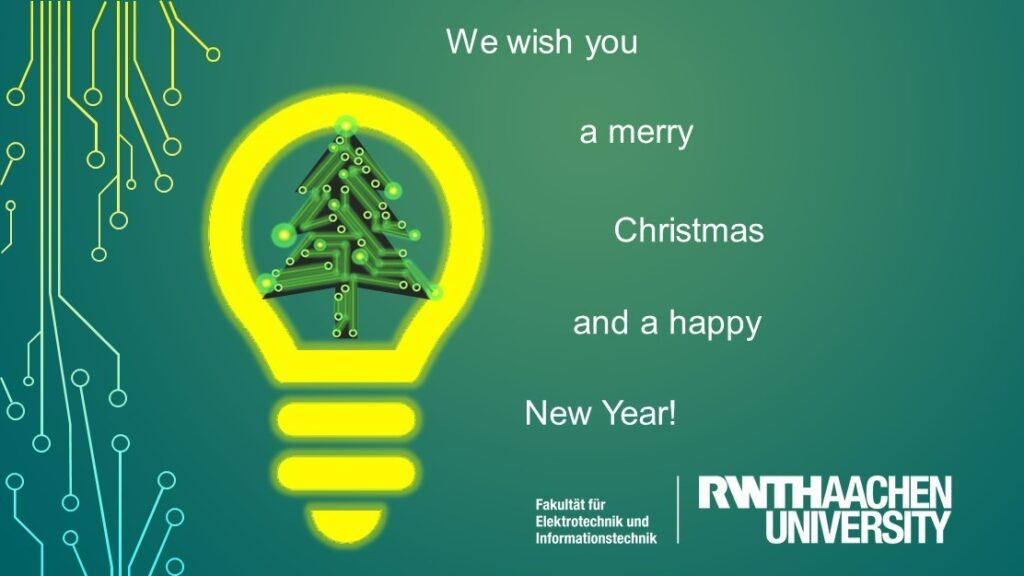
Otto Junker Awards 2022
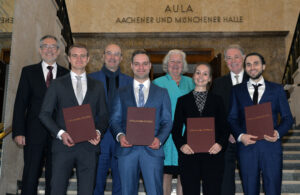
Image: Ryan Benkert, Daniel Fallnich, Josefin Wilkes and Tomasz Engelmann (front, from left) were awarded the Otto Junker Prize. Wolfgang Bleck, Ulrich Rüdiger, Marianne Conradt and Udo vom Berg congratulated the winners (back, from left).
Photo: Andreas Schmitter
Awarded for outstanding academic achievements
Ryan Benkert, Tomasz Engelmann, Daniel Fallnich and Josefin Wilkes received the 2022 Otto Junker Prize for their outstanding academic achievements. The Otto Junker Prize is conferred annually to RWTH students from the Faculty of Electrical Engineering and Information Technology and the Materials Science and Engineering Division of the Faculty of Georesources and Materials Engineering.
The Otto Junker Foundation was founded in 1970 by Dr.-Ing. E.h. Otto Junker. As a former RWTH, he felt intimately connected to the University throughout his life and particularly valued the scientific exchange. The aim of the foundation is to support young scientists and to promote numerous individual projects. Udo vom Berg, Chairman of the Supervisory Board of Otto Junker GmbH, and RWTH Rector Ulrich Rüdiger presented the awards at a ceremony. Professor Wolfgang Bleck, Chairman of the Foundation’s Scientific Advisory Board, and District Mayor Marianne Conradt congratulated the winners.
Ryan Benkert was born in January 1997 and did his Abitur in Gilching. He then studied electrical engineering, information technology and computer engineering at the RWTH and completed his master’s degree with a grade of 1.0. The master’s thesis with the topic “Out-of-Distribution Detection for Unsupervised Perception Systems” was written at the Chair for Integrated Systems of Signal Processing under the direction of Professor Gerd Ascheid. During his studies, he completed a stay at the Georgia Institute of Technology, funded by the Deutschlandstipendium and a Georgia Tech scholarship. He also completed three internships in the US, one of which was in Cupertino at Apple. Benkert is currently receiving his doctorate at the Georgia Institute of Technology in Atlanta, USA.
Daniel Fallnich, born in 1996, comes from Hanover and completed a voluntary science year in the field of production technology after leaving school. He then studied electrical engineering and information technology at the University of Hanover in the bachelor’s program. He switched to the RWTH for his master’s degree and studied electrical engineering, information technology and computer engineering. Here he was on Dean’s list of the best students. Fallnich also completed a six-month course at the TU Delft in the Department of Quantum and Computer Engineering. The master’s thesis with the topic “Design of a Hardware Architecture for the Niederreiter Cryptosystem” was written at the Chair for Integrated Digital Systems and Circuit Design under the direction of Professor Tobias Gemmeke. Fallnich is currently working at IBM in Böblingen.
Friedrich Wilhelm Awards 2022
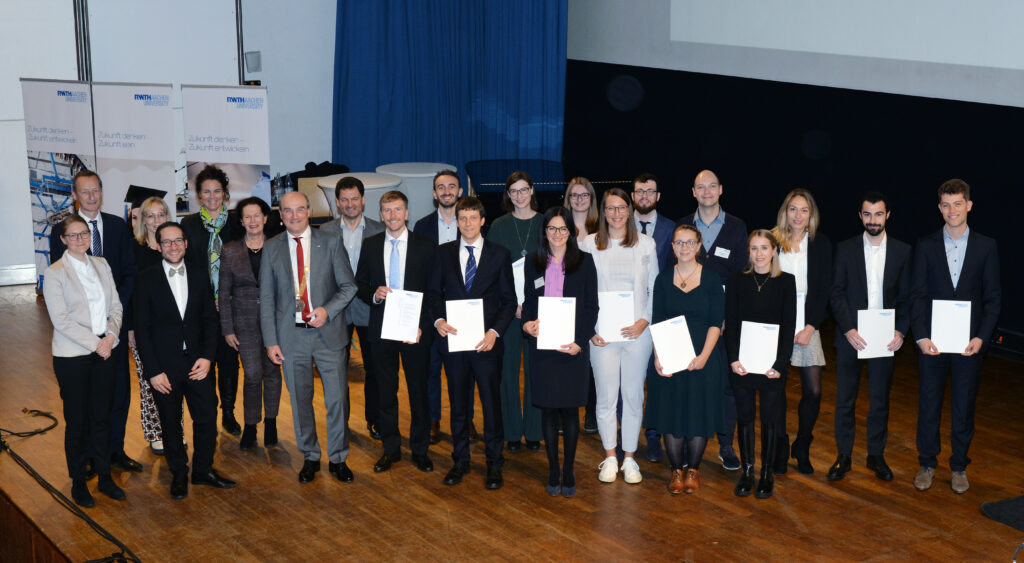
RWTH Rector Ulrich Rüdiger honored 17 outstanding graduates of RWTH Aachen University with the Friedrich Wilhelm Awards 2022.
Photo: Andreas Schmitter
Honoring outstanding achievements by RWTH Aachen graduates
The Friedrich Wilhelm Prize is awarded annually by the foundation of the same name in the form of prize money to students and researchers at RWTH Aachen University who have been selected for their outstanding achiements in their theses. Among this year‘s recipients are Maxim Christian Maria Müllender, Master of Science, from the Institute of High Voltage Equipment and Grids, Digitalization and Energy Economics and Laurids Schmitz, Master of Science, from the Institute for Power Electronics and Electrical Drives. Both winners were recognized due to their excellent master‘s theses.
Funding for research and teaching
The name of the foundation goes back to the Prussian crown prince and later Emperor Friedrich Wilhelm III., who founded a polytechnic institute in the Rhine province in 1858 using a donation from the Aachen and Munich fire insurance companies. In doing so, he laid the foundation for both the Rheinisch-Westfälische Technische Hochschule and the Friedrich Wilhelm Foundation, which is founded 1865 by the legal predecessor of today‘s Aachener und Münchener Beteiligungsgesellschaft. Since then, the promotion of research and teaching and the support of students and researchers at the RWTH Aachen have been the central concerns of the foundation.
How to report and benchmark emerging field-effect transistors
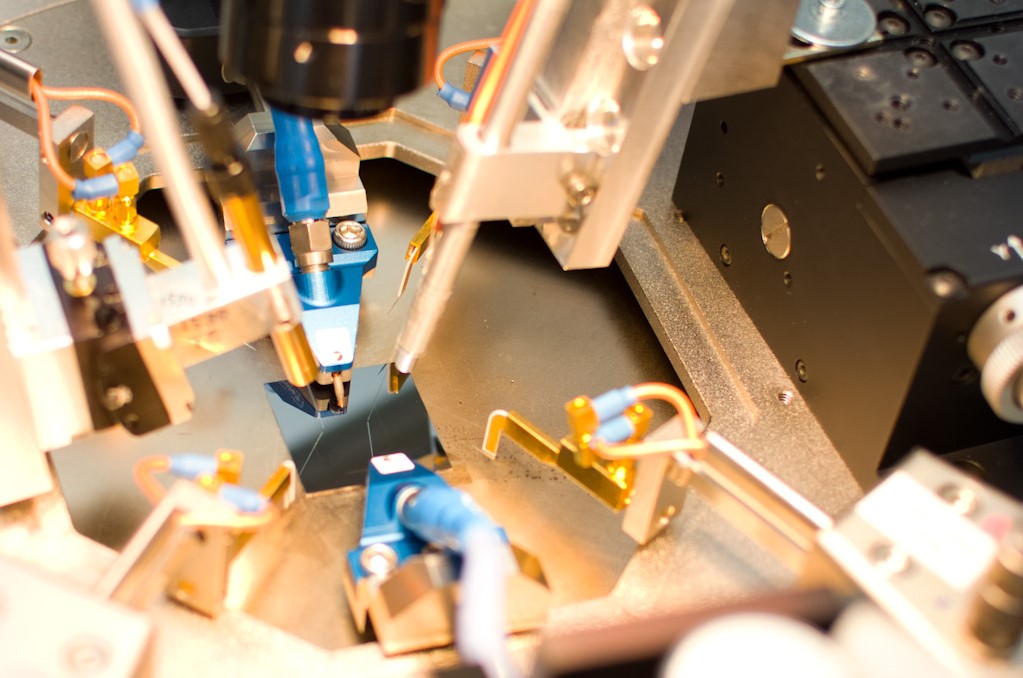
Messungen an einem Graphen-basierten FET in einer Messstation bei AMO. Photo: ©AMO GmbH
One of the challenges encountered by research on novel electronic devices is to compare devices based on different materials in a consistent way. RWTH Professor Max Lemme and colleagues from USA, China, and Belgium have now proposed a set of clear guidelines for benchmarking key parameters and performance metrics of emergent field-effect transistors. The guidelines have been published as a Perspective Article in Nature Electronics.
Research on field-effect transistors (FET) has long explored the possibility of replacing silicon as channel material with emerging nanomaterials, such as carbon nanotubes, graphene, transition metal dichalcogenides, organic semiconductors, or ultrathin oxides. The field is thriving and keeps uncovering fundamental aspects of these materials. But when it comes to comparing the performance of different devices, there is often a lack of consistent reporting and benchmarking
“Assessing consistently the potential of new materials for novel transistors is difficult, because the performance depends on many aspects and details of the device structure, and many parameters are interdependent.” explains Prof. Lemme. Further complexity is added to the field by the interdisciplinarity of the research community, which includes electrical engineers, chemists, materials scientist and physicists. The multitude of approaches increases the challenge of reporting and benchmarking results consistently.
To address this situation, Lemme and colleagues have prepared a checklist of device parameters to be reported, as well as a list of recommended benchmarking plots to compare device parameters and performance metrics. In addition, they present an explicit example of how to use the proposed procedure by applying it to the case of FETs based on monolayer molybdenum disulfide (MoS2), which is one of the emerging materials most studied in recent years for transistor application.
“To identify the real advantages and opportunities offered by novel materials in the search for improved transistors, we need to be able to benchmark and report different devices in a consistent way. We also need to make sure that all relevant data are reported every time.” adds Lemme. “We hope that our work will contribute to bring clarity in the community and guide the search for even better devices.”
Bibliographic info
“How to report and benchmark emerging field-effect transistors”
Z. Cheng, C.-S. Pang, P. Wang, S. T. Le, Y. Wu, D. Shahrjerdi, I. Radu, M. C. Lemme, L.-M. Peng, X. Duan, Z. Chen, J. Appenzeller, S. J. Koester, E. Pop, A. D. Franklin, and C. A. Richter, Nature Electronics 5, 416–423 (2022).
DOI: https://doi.org/10.1038/s41928-022-00798-8
Contact:
AMO GmbH, Gesellschaft für Angewandte Mikro- und Optoelektronik
Otto-Blumenthal-Str.25S
52074 Aachen
haupt@amo.de
“ELMAR” project: The ISEA is part of it!
The objective of the ELMAR project is to integrate the use of electric heavy mining machinery in the domestic extractive industry and demonstrate its utility.
A secure supply of mineral raw materials is essential for the competitiveness and prosperity of Germany and Europe. At the same time, raw material extraction results in substantial carbon dioxide emissions and therefore needs to become more sustainable in order to help achieve climate targets and to remain competitive. This includes, in particular, the decarbonization of operations that extract raw material. In Germany, this affects around 1,600 companies with around 2,700 plants and 23,500 employees in gravel, sand, and natural stone production alone.
Up to now, a significant proportion of the energy used in the extraction of raw materials at these plants has been used for internal transport. And most of this energy is being consumed by mobile diesel-powered (heavy-duty) vehicles. Conversion to (battery) electric operation is therefore a key lever for reducing emissions in this sector. This applies to the retrofitting of existing companies as well as to future projects.
Decarbonization of Domestic Raw Material Extraction – A Holistic Approach
In the newly launched ELMAR project, a consortium of research and industry partners is investigating how the decarbonization of the raw materials sector can be achieved and implemented in a holistic approach. The project involves the deployment of autonomous electric heavy-duty electric mine transport systems, the adaptation of the infrastructure this requires, and the redesign of operational processes. In addition, the project seeks to optimize the matching of energy demand and energy supply with the help of a connected, model-based and intelligent operational management.
ELMAR lays an important foundation for the integration of electric automated mobile heavy-duty transport machines in raw material extraction,” says Dr. Tobias Hartmann of the Institute for Advanced Mining Technologies at RWTH Aachen University. “Maintaining process reliability in extraction while ensuring security of electrical supply, as well as coupling it to renewable energy sources, we want to demonstrate in representative application scenarios that electrical transport is possible in domestic resource extraction. The holistic approach taking production, energy demand and energy supply aspects int account makes it possible to optimize existing and upcoming operating concepts.”
The consortium consists of two RWTH institutes, the Institute for Advanced Mining Technologies (AMT) and the Institute for Power Electronics and Electrical Drives (ISEA), and industry partners. Volvo Group Trucks Central Europe GmbH, Volvo Construction Equipment Germany GmbH, and Volvo Autonomous Solutions AB (commissioned by VCE Germany GmbH), are participating as construction equipment and transport vehicle manufacturers and automation providers. Other partners include mine operators Mineral Baustoffe GmbH (part of the STRABAG Group), Knauf Gips KG, and Nivelsteiner Sandwerke & Sandsteinbrüche GmbH; AI and cloud-based software providers PSI Fuzzy Logik & Neuro Systeme GmbH and PSI Software AG; and TITUS Research GmbH as a developer of autonomous monitoring systems.
The ELMAR project is scheduled to run until the end of July 2025 and receives around 6 million euros from the German Federal Ministry of Economics and Climate Protection (BMKW) as part of the “Research and Development in the Field of Electromobility” funding initiative.The total project volume is around 11 million euros.
Contact:
Dr.-Ing. Tobias Hartmann
Institute for Advanced Mining Technologies (AMT)
Telefon: +49 241 80 90755
E-Mail: thartmann@amt.rwth-aachen.de
www.amt.rwth-aachen.de/
Source: University News
Electrical Engineering Writing Workshop Winter Semester 2022/23
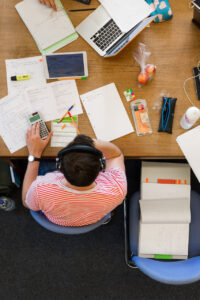
© Martin Braun
Course offer
October 20, 2022 to January 26, 2023
Also this semester the “Writing Workshop Electrical Engineering” is offered for the students of Faculty Electrical Engineering and Information Technology. The offer is the result of the collaboration of the Writing Center at the Language Center, the Student Advice Centre and the Faculty of Electrical Engineering and Information Technology at RWTH Aachen University.
Students have the opportunity to register for one of the two courses offered and thus improve their skills in writing a term paper or final thesis. Necessary knowledge and writing strategies will be taught in a practical way. In addition, students can take advantage of an individual online writing consultation.
The course offer is aimed at all Bachelor and Master students of the Faculty of Electrical Engineering and Information Technology who are writing a term paper or final thesis.
Dates
| Group 1 02.54478 |
Group 2 02.54479 |
| Thu, 20.10.2022 Thu, 10.11.2022 Thu, 24.11.2022 Thu, 08.12.2022 |
Thu, 17.11.2022 Thu, 01.12.2022 Thu, 12.01.2023 Thu, 26.01.2023 |
Registration
Registration deadline: September 30 to October 10, 2022
Registration takes place via the user account at RWTH Writing Center.
Upon successful participation, students will receive a certificate and 3 CP, which are creditable for the core elective section. International students have to prove a German language skills of at least C1.2 as a participation requirement.
Contact for inquiries: schreibzentrum@sz.rwth-aachen.de
Professor Franscesca Santoro received the Leopoldina Early Career Award
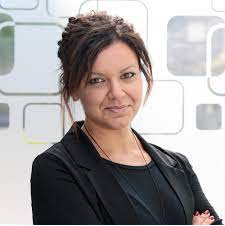 Professor Franscesca Santoro received the Early Career Award from the Leopoldina – National Academy of Sciences on September 23, 2022. She received the €30,000 prize for her research work in the field of bioelectronics and the development of novel materials that can interact with the skin and the brain. You can read more information on the Leopoldina news page.
Professor Franscesca Santoro received the Early Career Award from the Leopoldina – National Academy of Sciences on September 23, 2022. She received the €30,000 prize for her research work in the field of bioelectronics and the development of novel materials that can interact with the skin and the brain. You can read more information on the Leopoldina news page.
SAVE THE DATE: TDEI on November 18, 2022
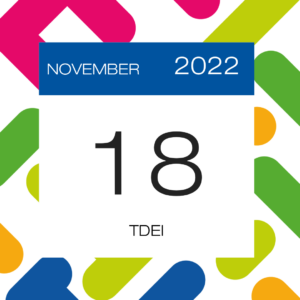 For more than 50 years, the Faculty of Electrical Engineering and Information Technology at RWTH Aachen University has stood for the excellent training of highly qualified and responsible engineers. This is regularly reflected in top places in national and international rankings. Last but not least, the constructive business partnerships that enable our students to gain an insight into and work on interesting projects and theses are responsible for this success.
For more than 50 years, the Faculty of Electrical Engineering and Information Technology at RWTH Aachen University has stood for the excellent training of highly qualified and responsible engineers. This is regularly reflected in top places in national and international rankings. Last but not least, the constructive business partnerships that enable our students to gain an insight into and work on interesting projects and theses are responsible for this success.
We would like to present this success on the 23rd Day of Electrical Engineering and Information Technology, which will take place on November 18, 2022, and bring companies, students, faculty members and graduates together. We are pleased to be able to invite our graduates to the Day of Electrical Engineering and Information Technology again this year and to be able to say goodbye in a festive setting.
For the latest information on TDEI 2022, please visit our TDEI page.
Support in Choosing a Degree Programme: Online Workshop of the Student Advice Centre

© Stefan Hense
The Student Advice Centre of RWTH is offering workshop dates in the next few months to support pupils and prospective students in choosing the right degree programme. In small groups, relevant topics are worked on interactively, such as decision-making processes, exploration of interests and self-examination, as well as decision-making aids for the choice of degree programme.
Workshop dates:
Fri, September 9, 2022, 10am to 4pm
Wed, October 5, 2022, 10am to 4pm
Thu, November 10, 2022, 10am to 4pm
Thu, December 8, 2022, 10am to 4pm
Fri, January 20, 2023, 10am to 4pm
In the workshops, participants will be given tools that can support them in their own study orientation. Participation is particularly useful if it is voluntary and there is a willingness to work out one’s own study decision. Please note that the workshop will be held in German.
Participation is free of charge. All information on registration and further details can be found on the workshop page of the Student Advice Centre.
German Study Award of the Körber Foundation 2022: 2nd Prize Goes to Weihan Li from ISEA
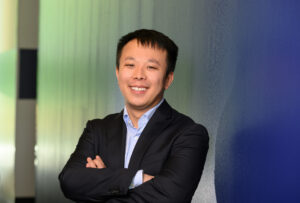
© David Ausserhofer: Dr. Weihan Li
Dr. Weihan Li has been awarded the second German Study Prize of the Körber Foundation for his dissertation.
Every year, the foundation awards the German Study Award to the best doctoral students from all disciplines. The main focus here is on the social significance of the research. We congratulate Dr. Weihan Li from the Institute for Power Electronics and Electrical Drives for his outstanding achievement.
Abstract:
Machine learning for efficient battery use in mobility and energy supply for sustainable climate protection
In the fight against climate change, batteries play a crucial role as a flexible energy storage system for renewable energies. However, battery ageing during use is proving to be the limiting factor for an efficient and reliable future energy system. In this work, machine learning enables online ageing diagnosis, prediction of future ageing progression and optimisation of operation strategy, which not only increases battery performance and lifetime, but also reduces unexpected failures and contributes to more transparency about battery health. The methodology developed improves battery use in mobile and stationary applications, enabling safer and longer-lasting operation, which saves costs in the long term, conserves resources and is socially feasible. This work thus provides an essential building block for the broad acceptance and implementation of climate-friendly mobility and energy supply on the way to a climate-neutral energy system.
We would also like to congratulate Dr. Lars Nolting from the Chair of Energy System Economics at RWTH Aachen University on winning the first prize, as well as all the other prize winners:
Dr. Manuel Häußler from the University of Konstanz, Dr. Kim Teppe from the University of Hamburg, Dr. Julia Böcker from the University of Lüneburg, Dr. Mareike Trauernicht from the Free University of Berlin and Dr. Felix Lansing from the Technical University of Dresden.
For more information on the German Study Award 2022, please see the press release of the Körber Foundation.



